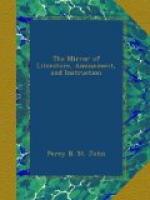her whole heart was engaged. This predilection
for studious retirement she is said to have manifested
at the early age of four years. Reports, and
even recollections of this kind, are to be received,
the one with some distrust, the other with some allowance;
but when that allowance is made, the genius of this
child still appears to have been as precocious as it
was extraordinary. Instead of playing with her
schoolmates, she generally got to some secluded place,
with her little books, and with pen, ink, and paper;
and the consumption which she made of paper was such
as to excite the curiosity of her parents, from whom
she kept secret the use to which she applied it.
If any one came upon her retirement, she would conceal
or hastily destroy what she was employed upon; and,
instead of satisfying the inquiries of her father
and mother, replied to them only by tears. The
mother, at length, when searching for something in
a dark and unfrequented closet, found a considerable
number of little books, made of this writing-paper,
and filled with rude drawings, and with strange and
apparently illegible characters, which, however, were
at once seen to be the child’s work. Upon
closer inspection, the characters were found to consist
of the printed alphabet; some of the letters being
formed backwards, some sideways, and there being no
spaces between the words. These writings were
deciphered, not without much difficulty; and it then
appeared that they consisted of regular verses, generally
in explanation of a rude drawing, sketched on the
opposite page. When she found that her treasures
had been discovered, she was greatly distressed, and
could not be pacified till they were restored; and
as soon as they were in her possession, she took the
first opportunity of secretly burning them.
These books having thus been destroyed, the earliest
remaining specimen of her verse is an epitaph, composed
in her ninth year, upon an unfledged robin, killed
in the attempt at rearing it. When she was eleven
years of age, her father took her to see the decorations
of a room in which Washington’s birthday was
to be celebrated. Neither the novelty nor the
gaiety of what she saw attracted her attention; she
thought of Washington alone, whose life she had read,
and for whom she entertained the proper feelings of
an American; and as soon as she returned home, she
took paper, sketched a funeral urn, and wrote under
it a few stanzas, which were shown to her friends.
Common as the talent of versifying is, any early manifestation
of it will always be regarded as extraordinary by
those who possess it not themselves; and these verses,
though no otherwise remarkable, were deemed so surprising
for a child of her age, that an aunt of hers could
not believe they were original, and hinted that they
might have been copied. The child wept at this
suspicion, as if her heart would break; but as soon
as she recovered from that fit of indignant grief,
she indited a remonstrance to her aunt, in verse,
which put an end to such incredulity.




